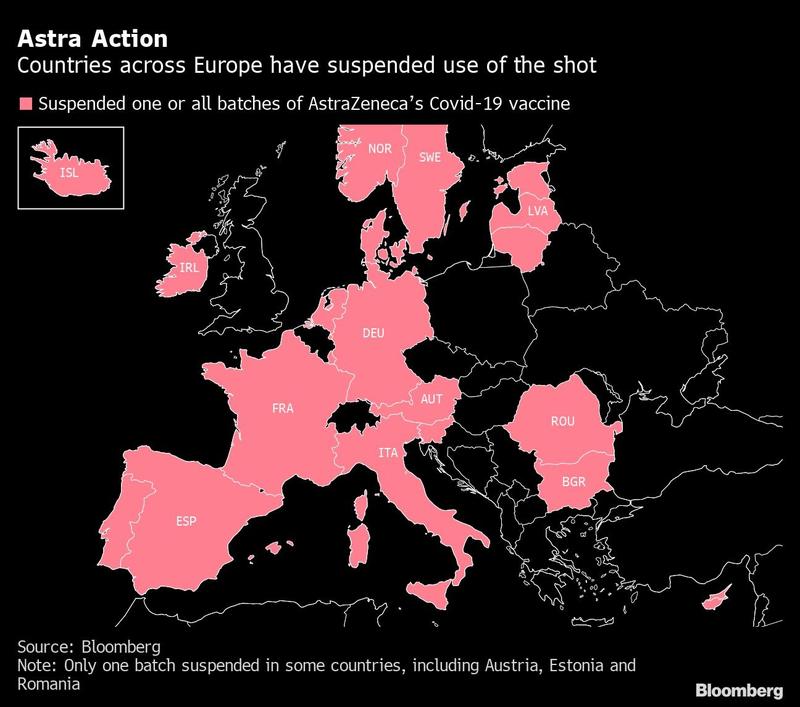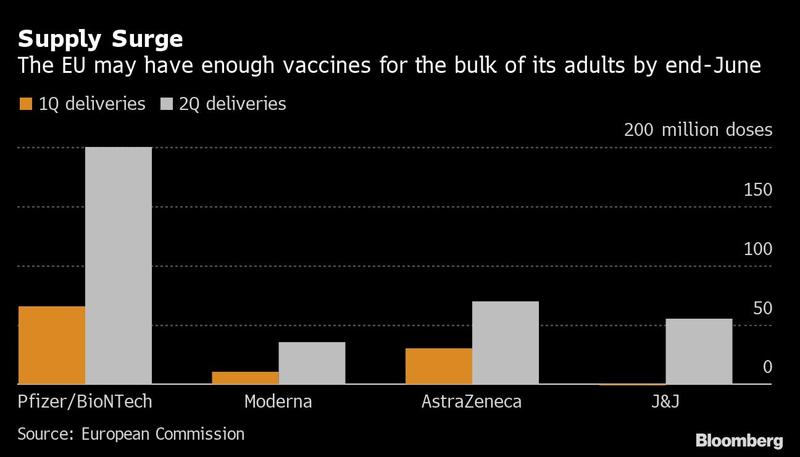
The European Union (EU) is bracing for a decision by its health regulator on whether AstraZeneca Plc’s COVID-19 vaccine is safe to use, a key step in the bloc’s efforts to move past a messy suspension by several countries.
The European Medicines Agency (EMA), which has consistently backed the shot even amid concerns about the risk of blood clotting, will issue updated guidance on Thursday. While a positive recommendation should give governments in France, Germany and elsewhere the confidence to resume using the vaccine, there’s already been some damage done.
The suspensions were another setback for the EU’s sputtering inoculation program, which has lagged far behind former member the UK. A rift between London and Brussels over vaccine supply widened on Wednesday after the EU threatened to block exports and the UK blamed reduced shipments for slowing down its pace of vaccinations.
The European Medicines Agency (EMA), which has consistently backed the shot even amid concerns about the risk of blood clotting, will issue updated guidance on Thursday
Meanwhile, thousands of appointments were canceled in Europe even as infections surge again and authorities impose fresh restrictions. Critics warn the delays will cause far more deaths from COVID-19 than might have resulted from possible side effects, while also undermining peoples’ faith in vaccines and willingness to roll up their sleeves.
“There was no reason to suspend the AstraZeneca vaccination,” said Professor Gilles Deray of the Pitie-Salpetriere hospital in Paris. The decisions are a “magnificent example of European failure.”
After Denmark became one of the first countries in the region to suspend AstraZeneca’s vaccine, the EMA said on March 11 that the number of clots in vaccinated people was no higher than that in the general population.
On Wednesday, the World Health Organization said it’s assessing safety data, but currently recommends continued use because the benefits outweigh risks.
ALSO READ: WHO backs AstraZeneca vaccine, says benefits outweigh risks
It may take more to reverse public concerns. Just hours after Italy announced an investigation into fatalities of inoculated people - and before the suspension of Astra shots - the impact was immediate at an immunization center in the small town of Villorba in the northern Veneto region.
“No one canceled, people simply didn’t come in,” Francesco Benazzi, who runs healthcare in the district, said in a phone interview.
In Sicily, the southern region where one of the fatalities occurred, some 10,000 people canceled vaccination appointments. About 4,000 called off appointments in Tuscany, according to local media reports.
Despite the suspensions, governments are wary of frightening the public even more, and many said the measures were purely precautionary and temporary. European Commission President Ursula von der Leyen expressed hope on Wednesday that the situation will soon be resolved.
“I trust AstraZeneca. I trust the vaccines,” she said. “EMA will give a statement and I’m convinced that the statement will clarify the situation.”
READ MORE: EU health ministers debate Astra shot after halting vaccine
The commission has committed to immunizing 70 percent of adults by the end of September but has suffered from supply issues that have already led to a fight with AstraZeneca over slow deliveries. The EU has administered 12 doses per 100 people, less than a third of the UK, according to Bloomberg’s Coronavirus Vaccine Tracker. Britain continues to deem the Astra shot safe.
The Astra vaccine is one of four approved in the EU. The bloc expects 360 million deliveries from all providers in the second quarter, almost four times as many as this quarter.

Delays in inoculating people against the disease risks prolonging pandemic lockdowns and hampering the recovery, according to Veronika Grimm, one of German Chancellor Angela Merkel’s economic advisers.
“The availability of effective vaccines and a rapid rollout of vaccinations are deciding factors in the fight against the coronavirus pandemic,” she said as the group cut growth forecasts on Wednesday. “And with that, a hasty rollout of the vaccine is the biggest opportunity for the economy.”
Germany’s handling of the safety concerns could also have political fallout, even though its sudden reversal on Astra - days after backing it as safe - was based on new evidence. The u-turn meant some opposition politicians have called for Health Minister Jens Spahn’s removal.
READ MORE: Merkel's bloc sinks amid calls for health minister's removal
Merkel, whose party has slumped in polls, hasn’t spoken publicly about the decision.
For now, there are signs that the damage to public trust from the suspensions is limited. In Villorba, Benazzi worked the phones and managed to find replacements for the no-shows.
“At the end of the day we didn’t waste a single vial, but certainly fear could still impact vaccinations in the coming weeks,” he said.


